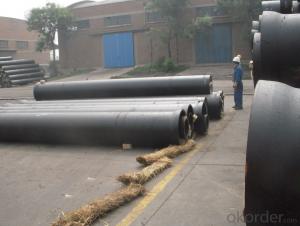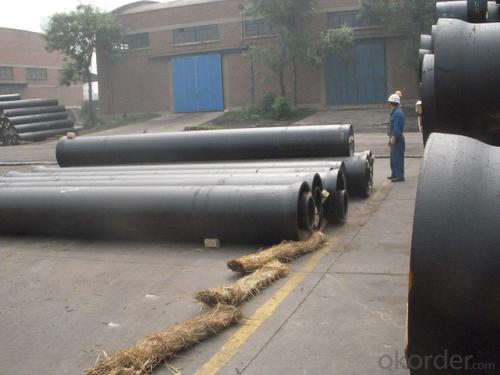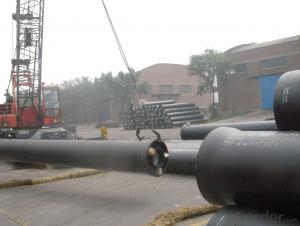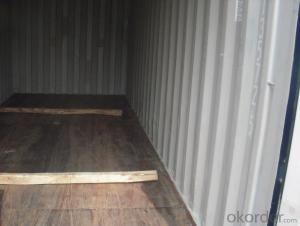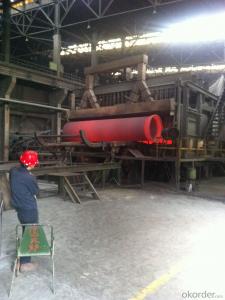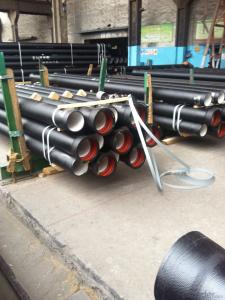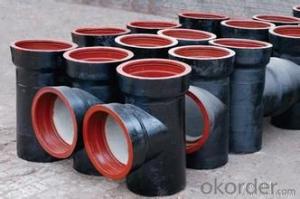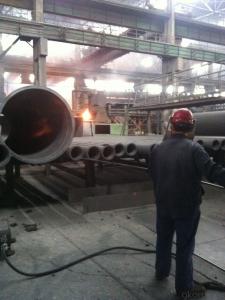DUCTILE IRON PIPE AND PIPE FITTINGS K7 CLASS DN1500
- Loading Port:
- Tianjin
- Payment Terms:
- TT OR LC
- Min Order Qty:
- 23 pc
- Supply Capability:
- 3000 pc/month
OKorder Service Pledge
OKorder Financial Service
You Might Also Like
· Material : Ductile Cast Iron
· Size Range : DN 80mm to DN 2000mm
· Unit Effective Length : 6m or 5.7m
· Manufacture Standard: ISO 2531:1998/ EN 545:2006/EN 598:2007
· Annual capacity : 200,000 tons
· Coating Exterior: Zinc 130g/m2 according to ISO 8179-1 and bitumen coating 70 microns.
· Cement Interior: Portland Cement/ High Alumina Cement/ Sulphate Resisting Cement Lining according to ISO 4179
· Special requirements on external coating and internal lining can be applied
· We also provide accessories such as SBR/EPDM rubber gaskets, lubricant paste, pipe caps, PE sleeves, etc.
Additional Parts:
Each pipe is strictly inspected according to related standard to ensure permanently high performance.
Easy Installation at site and service free for life
Long Service Lifespan
Quotation will arrive you within 24hours once we get your inquiry.
We guarantee offering you a competitive price.
A copy of original inspection reports of pipes will be offered after shipment.
Photos of loading process will be sent to the customer after shipment effect.
We will follow-up the delivery progress after shipment effect and update to the customer on weekly basis.
- Q: Are ductile iron pipes susceptible to external loading or pressure?
- Yes, ductile iron pipes are susceptible to external loading or pressure. Like any other material, ductile iron pipes have a certain amount of strength and tolerance to withstand external forces. However, excessive external loading or pressure can cause deformation or failure of the pipes. It is important to ensure that ductile iron pipes are installed and supported properly to prevent any damage due to external loading. Additionally, the design and engineering of the pipeline system should take into consideration the anticipated external loading and pressure to ensure the pipes can effectively handle the expected conditions. Regular inspections and maintenance are also crucial to identify and address any issues related to external loading or pressure that may arise over time.
- Q: Are ductile iron pipes suitable for power plant cooling systems?
- Yes, ductile iron pipes are suitable for power plant cooling systems. Ductile iron pipes offer excellent strength, durability, and corrosion resistance, making them ideal for handling high temperature and high-pressure water flows commonly found in power plant cooling systems. Additionally, their flexibility and ease of installation make them a cost-effective choice for such applications.
- Q: Can ductile iron pipe be used for industrial process piping?
- Indeed, industrial process piping can make use of ductile iron pipe. Renowned for its robustness, longevity, and ability to withstand corrosion, ductile iron pipe proves itself as an appropriate selection for diverse industrial functions. It boasts the capability to manage high-pressure systems and commonly finds application in sectors like water and wastewater treatment, oil and gas, chemical processing, and power generation. Moreover, ductile iron pipe offers ease of installation and an extensive lifespan, thus rendering it a cost-efficient choice for industrial process piping.
- Q: How are ductile iron pipes different from PVC pipes?
- Ductile iron pipes and PVC pipes are two different materials commonly used in plumbing and water distribution systems. The main difference between ductile iron pipes and PVC pipes lies in their composition and properties. Ductile iron pipes are made from a specific type of cast iron that contains graphite nodules, which give the material its ductility and flexibility. This allows the pipes to withstand high pressures and heavy loads without breaking or cracking. Ductile iron pipes are known for their strength and durability, making them ideal for underground applications and areas with high traffic loads. On the other hand, PVC pipes are made from a type of plastic called polyvinyl chloride. PVC pipes are rigid and inflexible, and they do not have the same strength as ductile iron pipes. PVC pipes are commonly used in low-pressure applications, such as residential plumbing systems, irrigation, and drainage systems. They are lightweight, easy to install, and resistant to corrosion, making them a popular choice for residential and non-industrial applications. Another difference between ductile iron pipes and PVC pipes is their cost. Ductile iron pipes tend to be more expensive due to their higher material and production costs. PVC pipes, on the other hand, are relatively cheaper to manufacture, making them a cost-effective option for many plumbing projects. In summary, the main differences between ductile iron pipes and PVC pipes are their composition, strength, flexibility, and cost. Ductile iron pipes are made from cast iron and are known for their strength and durability, while PVC pipes are made from plastic and are more lightweight and cost-effective. The choice between ductile iron pipes and PVC pipes depends on the specific requirements of the plumbing project, including pressure, load-bearing capacity, and budget considerations.
- Q: How long is the service life of the cast iron pipe, and the time of use of ductile iron pipes?
- When it comes to the service life of nodular cast iron, its maintenance is essential for its long service life. Then, the focus of the maintenance of ductile iron pipe is to pay special attention to, will affect the long-term use of ductile iron pipes, stable operation of socket, row, etc., we should make efforts to these aspects of the mouth without debris. Make sure that the rubber ring of the ductile iron pipe has been smashed with a rubber hammer, and it is not twisted or twisted, and it is uniformly stuck in the slot. Ductile iron pipe in the maintenance process, because of the pneumatic tube axis is buried into the ground, so in the face of a tilt angle of the time, we must be careful, if the resistance is too large, will not force the excavation, in order to prevent the distortion of the rubber ring.
- Q: What are the typical joint sealing requirements for ductile iron pipes under pressure?
- The typical joint sealing requirements for ductile iron pipes under pressure involve the use of gaskets and mechanical joints to ensure a leak-free connection. Gaskets are typically made of rubber or synthetic materials and are placed between the pipe ends to create a tight seal. These gaskets are designed to withstand the pressure of the flowing fluid and prevent any leakage. They also provide flexibility to accommodate for any slight misalignment or movement of the pipes. Mechanical joints, such as push-on joints or restrained joints, are another common method of sealing ductile iron pipes. These joints consist of a mechanical connection that securely holds the pipe ends together. They can provide a reliable seal without the need for additional gaskets. In addition to gaskets and mechanical joints, proper installation techniques are crucial for ensuring effective joint sealing. This includes proper alignment of the pipes, correct tightening of bolts or screws, and the use of appropriate lubricants or sealants. It is important to note that the specific joint sealing requirements for ductile iron pipes under pressure may vary depending on the application, the type of fluid being transported, and the applicable industry standards or regulations. Therefore, it is essential to consult the manufacturer's guidelines and relevant codes to determine the appropriate joint sealing requirements for a specific project.
- Q: How can the three pipes of ductile iron leak?
- When the pipe connection of the three water leakage, first of all to see whether it is to do the pipe three links of the manufacturers, pressure did not reach, if it is. It is only the replacement, if not, with cast iron electrode welding, or socket connection half!
- Q: Why is the cast iron tube lined with cement? Under what circumstances are ductile iron pipes lined with cement, and under what circumstances do not have to be lined with cement?
- The cement lining protects the water quality, reduces the head loss and improves the service life of the spheroidal graphite pipe. As long as the water delivery hose is used, the cement lining must be used. There is no lining cement for conveying air.
- Q: How are ductile iron pipes different from other types of pipes?
- Ductile iron pipes, also known as DI pipes, are distinct from other types of pipes due to their unique properties and manufacturing process. Unlike other pipes such as PVC, steel, or concrete, ductile iron pipes are specifically designed to withstand high-pressure systems and offer exceptional strength and durability. One key difference lies in the material used. Ductile iron pipes are made from a type of cast iron that contains additional elements such as carbon and silicon, which give them their remarkable strength and flexibility. This composition allows DI pipes to handle high-pressure systems, making them suitable for applications that require reliable water supply, such as water mains, sewer systems, and industrial pipelines. Another distinguishing feature of ductile iron pipes is their ability to withstand external loads and pressure. DI pipes have a high tensile strength, which means they can bear heavy loads without cracking or breaking. This property makes them ideal for underground installations where they can endure the weight of soil, traffic, and other external factors. Furthermore, ductile iron pipes have excellent corrosion resistance. They are coated with a protective layer, usually through a process called cement lining, that guards against rust and corrosion caused by the elements, chemical reactions, or the transported fluids. This corrosion resistance significantly extends the lifespan of the pipes, reducing maintenance and replacement costs over time. Additionally, ductile iron pipes offer great flexibility. They are known for their ductility, meaning they can deform without fracturing under stress, making them less prone to cracks and leaks. This inherent flexibility allows them to withstand ground movement and seismic activities, ensuring a safe and reliable water distribution system. In terms of installation, ductile iron pipes are relatively easy to handle due to their lighter weight compared to other materials like concrete or steel. They are also available in various lengths and diameters, making them adaptable to different project requirements. Overall, ductile iron pipes stand out from other types of pipes due to their exceptional strength, resilience, corrosion resistance, and ease of installation. These properties make them a preferred choice for numerous infrastructure projects, where reliability and longevity are crucial factors.
- Q: How do ductile iron pipes handle ground movement due to tree roots?
- Ductile iron pipes are known for their strong and durable nature, making them highly resistant to ground movement caused by tree roots. The flexibility of ductile iron allows it to withstand the pressure exerted by growing tree roots without fracturing or breaking. This is due to the material's ability to absorb and distribute stress, which helps to minimize the impact of ground movement. Moreover, ductile iron pipes have a smooth inner surface that minimizes the chances of tree root intrusion. The tightly sealed joints between the pipes also prevent roots from penetrating and causing damage. In instances where tree roots do manage to penetrate the soil and come into contact with ductile iron pipes, their resistance to corrosion provides an added advantage. Ductile iron pipes are coated with a protective layer that prevents the formation of rust and corrosion, ensuring their longevity and structural integrity. However, it is important to note that while ductile iron pipes are highly resistant to ground movement caused by tree roots, regular inspection and maintenance are still recommended. This allows for early detection and necessary repairs to be carried out if any root intrusion or damage is identified.
Send your message to us
DUCTILE IRON PIPE AND PIPE FITTINGS K7 CLASS DN1500
- Loading Port:
- Tianjin
- Payment Terms:
- TT OR LC
- Min Order Qty:
- 23 pc
- Supply Capability:
- 3000 pc/month
OKorder Service Pledge
OKorder Financial Service
Similar products
Hot products
Hot Searches
Related keywords
